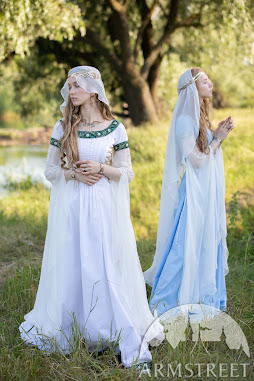Under the weeping willow, embedded
with
opulent pearl, for eternity—
silk
and cotton now momentarily
to the
floor, the mossy river threaded
through
the countryside ambling on at rest.
The
long draped wing-like creamy bell-shaped sleeves
hung,
momentous and old as the dry leaves
upon
the ground. The guests dressed in their best
were
unsure whether they were here, gifting
for a
moment or a new century,
as the
water floated by, the petals
met
reflection of the hills, now sloping
away
into the distance, luxury
of the
crescent moon still whitened, natal.
It’s
rare to be so quiet at deep grooves
that
the moon, still unborn, whispers loudly
amid
the bustle of skirts, with baby
carriages,
and swish of dark horses hooves.
It’s
rare to have a bluest heart so kind
that
one would flutter in midair over
the
stained purple-white wild lilies cover.
There
was a greenish bank where diamond rinds,
hues
of bubbles floated, amid stoic
remembrances
and florid faces, sound
as
glassy-eyed wine. The only priest was
present
in season of the Spring Fair, it
cantered
like a new horse, as he came ’round
only
twice per year when given good cause.
The
bride was wearing white soft-spoken lace,
her
ladies, blue willowy glass figures,
baby’s
breath to roses. Dainty creatures
of a
delicate nature, they made case
that
her figure was a pale rose in bloom
and
her soft creases did not hide a child,
shining
gold hair was plaited, smooth and mild,
she
was quite reverent of his duty too.
But
she was kind, and timely amid strife,
life
in its piercing the dank moss shallows
of her
life had made them crisp flowing pools,
and
she stretched out her hand, became a wife,
she
wore the diamond of her days, fallows
of a
fertile land, farmed with ancient tools.
This royal moment in the river field
acquiesced
to nature’s horn and plenty,
no woman’s
life should be poor and wanting;
translucent
gown following and men reeled
at the
sight of such a character to
stand
so graceful and so elegant, mild
as
would a maiden be, yet there with child,
as her
burgeoning soul would attest, blue
were
his eyes, and theirs was a renaissance
ceremony,
in formal dress, as spoke
the
custom of their age. They were not young,
too
young, to be the green reconnaissance
of all
love in youthful years, which day woke
too
early—was it just the web was spun?
The
matchmaker nodded her fair consent,
they
had breathed vows, a renaissance couple,
common
in their time, even nuptials
were
seen in almost half of cream crescent
moon
young lovers wed along shadowed lull
of
waters, where the trim of flowers deck
while
perfectly gathered at the scooped neck,
and
the pearl beaded bodice falls below
the
wedding full of fine giving detail,
a life
joined to a life is turtledoves—
where
no death, waxen, cold, where flaxen breathes
the
clothed bridesmaids celebrate, holding train.
The
vests of his men were as brown as cloves,
velvet,
and marching on in league motifs.
It was the Golden Age of Art Nouveau:
the
curved glass bell of time had rung before—
mosaics
out of brokenness, stained cores
of
glass rose from marble floor to dome, no
sinewy
sense of movement was nature’s
graceful
shapes paired with yellowed narcissus.
The
time of falling dusk had walked with us
into
the organic future that spurs
the
art of a new century, detail
fine
and ornamental in its finite
way of
climbing intricate design walk
of the
nineteenth century with black rail
to
render elements sculptural wine,
fluent
in curves, iris buds and starched stalks.
How
had this composite of medieval
times,
limber of foot, danced into black tie
irony
with exotic butterfly,
as was
the case of her entourage belles.
There
was the artist, the model a muse
sitting
pale, simple before the painter—
no
movement, hands folded, as in winter
of a
soul, a childless stance waiting, loose
of the
trappings of work and menial
blank
servitude that so characterized
the
eyes of darkened blind without new art;
here,
the dim room started, congenial
to be
receptive to old sterilized
forms
of dying while still alive, thou art.
Emily Isaacson
Photo used by permission: Armstreet Clothing Company
